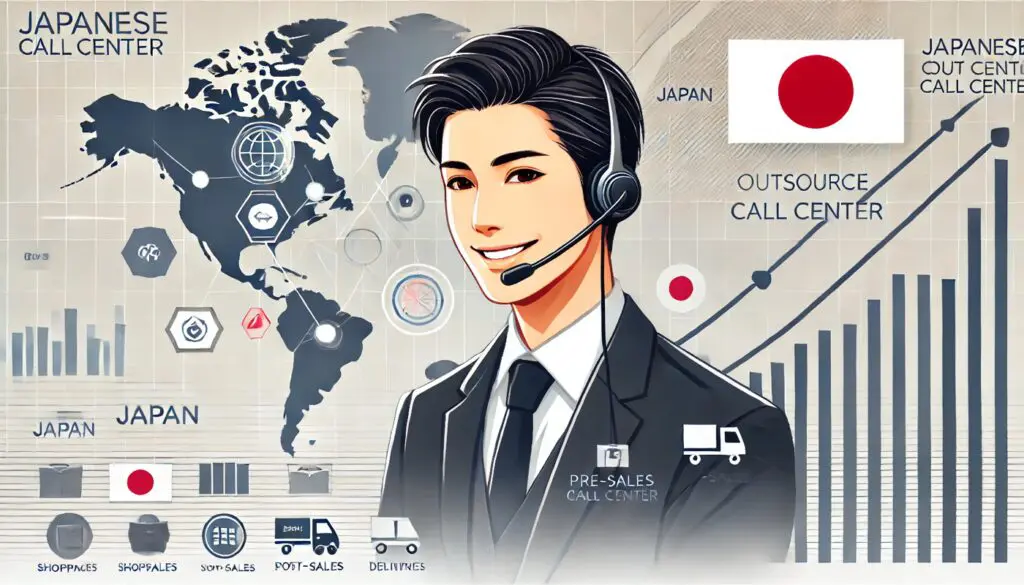Japan’s rapidly-evolving e-commerce market presents unique opportunities & challenges; a key player is the ever-critical customer support sector – where outsource call centers (Japan call centers) play an instrumental role. With the rise of e-commerce Japan significantly & positively impacting the country’s economy, the need for robust e-commerce customer support has never been more evident.
This comprehensive guide will delve into:
- nuances of Japan’s e-commerce market,
- its customer support landscape, and
- the strategies adopted by industry leaders to effectively-engage Japanese consumers, and
- the significant contribution of Japan call centers (i.e. Callnovo Contact Center) in aiding e-commerce companies like your own to penetrate this vibrant market, build strong competition, and achieve sustainable growth through superior e-commerce customer service.
The Rise of e-Commerce Japan
e-Commerce bolsters Japan’s economy, accounting for ~20% of retail sales as of 2022 (Japan’s Ministry of Economy, Trade, and Industry); predictions suggest this figure may rise to <30% by Q4 2023 (The Statistics Portal for Market Data), supported by a high internet penetration rate (Internet World Stats) and the acceleration of online shopping amid the COVID-19 pandemic, which saw a 16.5% growth in B2C e-commerce sales (2020) (Comprehensive Database for Global and Local eCommerce).
Key e-commerce market trends driving Japanese e-commerce market growth include:
- High Internet Penetration & Mobile Usage: as one the key e-commerce market trends, <93.5% of Japan’s population has internet access, making Japan a mobile-first country. Also, ~79% use smartphones, contributing to Japanese e-commerce market growth.
- Trust in Online Shopping: as another of the e-commerce market trends, Japanese customers’ trust in online shopping platforms has increased; Statista indicates: 83.5% of consumers between 16 & 64 years purchased online in the past month.
- Advanced Logistics: another of the key e-commerce market trends is that Japan’s logistics network ensures timely, efficient delivery of products, encouraging more people to choose online shopping, driving e-commerce growth.
- Social Commerce: e-Commerce integration into social media platforms is one of a few growing e-commerce market trends in Japan; 73% of internet users between 16 & 64 years used a social network in the past month for shopping-related purposes.
Along with this growth, there’s a growing demand for superior customer support; Japan’s e-commerce sector exhibits a customer-centric culture, with businesses aiming to maintain high service levels. Here, outsource call centers, that is Japan call centers, provide efficient, multilingual support ensuring seamless communication between eSellers & Japanese customers.
Japan’s customer support landscape reveals:
- a rise in social media as a customer service platform, with ~45% of e-Sellers offering social media support (Customer Service in Japan: 2020 Trends), and
- an uptrend in AI-powered customer service, with the AI market in customer service expected to grow at a 23% annual rate (AI in Customer Service Market in Japan | Growth, Trends, and Forecasts [2020 – 2025]).
e-Commerce’s growth in Japan presents a golden opportunity for your e-commerce seller; with expert customer support outsourcing solutions, you can penetrate the Japanese market, foster customer retention, and ensure sustainable growth.
Japanese e-Commerce Customer Profile
The unique Japanese customer service culture plays a crucial role in shaping the preferences & expectations of Japanese consumers; understanding this culture is essential to successful e-commerce Japan sales market expansion and the building of long-term customer acquisition/retention. Let’s visit this below.
Customer Service Culture in Japan
In Japan, customer service is highly-valued & deeply-ingrained in business culture; Japanese consumers have high expectations for quality service, prompt responses, and personalized interactions.
Here’re key characteristics of the Japanese service culture:
- Omotenashi: As a unique aspect of Japanese customer service culture, “Omotenashi” represents the act of providing detailed service that allows customers to spend a relaxing, enjoyable time by eliminating inconveniences & uneasiness; for example: ensuring a smooth browsing experience, providing detailed product descriptions, and offering swift responses to customer inquiries.
- High Customer Service Expectations: Japanese consumers have high service expectations; Microsoft found: 56% of Japanese consumers have confirmed having higher expectations more now so than 1 year ago.
- Politeness & Formality: Japanese culture values respect & politeness, reflected in their customer service; in the digital space, customers expect formal & respectful communication.
- Efficiency & Speed: Japanese consumers value quick, efficient service; this is particularly-important in e-commerce – as quick response times & efficient order processing are crucial.
Preferred Languages and Communication Preferences
To effectively-engage Japanese e-commerce customers then, your e-commerce business should consider these language & communication preferences:
- Native Japanese: While English proficiency is increasing, the majority of Japanese customers prefer brand communication in their native language and its dialects (Hyōjungo, Kansaiben, and Tōhokuben, etc.); customer support in Japanese is crucial for building trust, ensuring clear communication.
- Omnichannel Support: Japanese consumers appreciate ample brand-contact channels; in addition to traditional communication channels, Japanese consumers increasingly-prefer social media platforms (such as: LINE & Twitter) for brand engagement. Offering such support enhances customer satisfaction & engagement.
- Timely, Responsive Communication: Prompt, timely responses are highly-valued by Japanese customers; your eSeller should strive to provide quick resolution, maintaining open lines of communication to meet customer expectations.
Understanding the unique customer service culture in Japan, catering to the preferred languages & communication preferences of Japanese e-commerce customers, ensures effective engagement, achieving long-term growth & success.
Essential Customer Support Strategy(ies) for Top-notch Customer Engagement within the Japanese e-Commerce Market
To effectively-engage Japanese e-commerce customers, you must implement effective customer engagement strategies that align with the Japanese customer service culture; here’re some essential effective customer engagement strategies:
- Understanding/Respecting Cultural Nuances: The Japanese market shares a strong emphasis on respect/politeness; an effective customer support strategy includes training customer service reps (CSRs) to understand such cultural nuances – which helps secure customer experiences (CX) that are tailored to Japanese customers’ expectations.
- Multilingual Support: as another effective customer support strategy, Japanese support – including its dialects (even in English) – is crucial for effective communication; your ecommerce business should ensure customer support communicates effectively in such languages.
- 24/7 Support: With the rise in e-commerce Japan, Japanese consumers shop round-the-clock; such support ensures assistance whenever needed, enhancing customer satisfaction & loyalty.
- Leveraging Technology: Implementing AI chatbots & other advanced technology ensures prompt, efficient service, improving customer engagement & allowing CSRs to focus on complex inquiries.
Each customer support strategy can help penetrate the Japanese e-commerce market. For instance, Uniqlo offers native Japanese support, multi-channel service, and timely responses, finding success in Japan. Rakuten, the largest e-commerce company in Japan, meets Japanese customers’ communication preferences, providing responsive support. With these tactics, these businesses foster competition, customer acquisition, retention, and growth.
Crucial Role of Callnovo Contact Center in the Japanese e-Commerce Market

Callnovo Contact Center, one of the most-renowned, nearly 20-year tenured United Kingdom outsource call center providers (Japan call centers), plays a crucial role in providing high-quality customer support in Japan for businesses targeting the Japanese e-commerce market.
The significance & benefits Callnovo offers aren’t understatable:
- Cultural Competence: Callnovo’s team possesses a deep understanding of Japanese market & culture, ensuring effective communication – integral to engaging customers & building long-lasting customer relationships.
- Quality Customer Service: Callnovo’s high-quality, 24/7 customer service ensures Japanese customers’ concerns & inquiries are addressed promptly, fostering long-term trust & customer loyalty.
- Local Language Support: Callnovo’s native Japanese speakers eliminate language barriers, facilitating smooth, effective communication and enhancing CX & customer satisfaction.
- Advanced Tech Solutions: Callnovo leverages advanced technology for efficient call handling & data management, ensuring seamless operations & high-quality service, enabling businesses to thrive in the Japanese e-commerce market.
- Scalable Solutions: As businesses grow and evolve, Callnovo’s scalable solutions easily-accommodate such, ensuring sustained Japanese market support & success.
A Global Client Highlight: Callnovo’s been providing customer service outsourcing for 8+ years to a highly-reputable provider of internet router & WiFi extender products that sells online; this client (name kept confidential for data confidentiality purposes) services U.S., Brazilian, Colombian, and Peruvian sales markets, having partnered with Callnovo for hybrid tier technical support (tier 1 & tier 2) via native Spanish & upper-intermediate Brazilian Portuguese. Callnovo’s customer service outsource call center services focus on:
- First Call Resolution: resolving customer issues during initial contact; by employing knowledgeable agents, equipping them with comprehensive product info., Callnovo’s CSRs promptly-address inquiries, reducing repeat customer calls and shortening resolution times.
- Proactive Communication: proactive communication is initiated to inform customers of service upgrades, maintenance schedules, and other relevant info., keeping customers informed, reducing the likelihood of surprises or frustration due to unexpected disruptions.
- Customer Feedback & Surveys: regular customer satisfaction surveys are conducted to gather feedback on quality, identifying improvement areas to promptly-implement changes if necessary.
Conclusion
The success of global businesses in the Japanese market significantly-hinges on their ability to deliver superior service. Contact centers, like Callnovo Contact Center, are game-changers – offering you the advantage of language proficiency, cultural understanding, 24/7 support, multi-channel communication, cost-effective solutions, and advanced technology; with a proven track record, Callnovo guarantees increased customer acquisition/retention, fostering long-term business growth & sales success. To thrive in the competitive Japanese e-commerce landscape, outsourcing e-commerce Japan customer support to a professional, experienced outsource call center provider is not just an option, but a strategic necessity.

